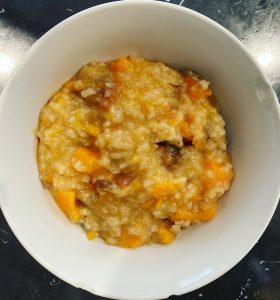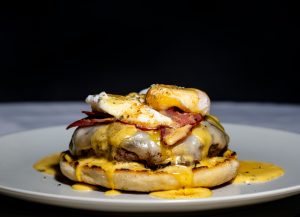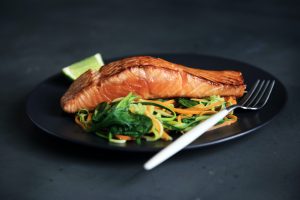Recipes
Tips for Resting & Digesting (food)
 It’s nice to eat nice foods—expensive and high quality foods—organic foods, locally grown, homemade, etc. But it isn’t just about what we eat, but how we eat, that will maximize the conversion of our food into nutrients, which will convert into globally good health.
It’s nice to eat nice foods—expensive and high quality foods—organic foods, locally grown, homemade, etc. But it isn’t just about what we eat, but how we eat, that will maximize the conversion of our food into nutrients, which will convert into globally good health.
Whether you use your hands or utensils is up to you and your social circle, but across the board everyone advises chewing our food until it is liquefied in our mouths. This is for the same rationale that Eastern medicines recommend warm and cooked foods—they are easier to digest. Whenever I bribe my toddler with dark chocolate, cheese, or bread, she’s suddenly lightning fast at shoveling two handfuls of vegetables into her mouth in anticipation of her treat; my wife and I have to remind her, almost like a cheerleading chant: “Chew, chew, chew!” “Mastica!”
Each organ channel has its many correspondences, to particular seasons, colors, of the five elements, as well as shapes. The spleen and stomach are ruled by circles (and the color yellow), which means the ideal way to eat and digest is at a roundtable (of loved ones), I suppose with a yellow tablecloth. Ironically, such interior design would likely make my wife vomit.
The point is, we supposedly metabolize our foods that much better when seated surrounded by the company of loved ones. This might explain why many cultures that are known more for their tight-knit communities than their health-conscious diets, live late into life before experiencing any ailments or disease.
Finally, and most importantly in my opinion, is the parasympathetic nervous system cliche of “rest and digest.” It’s not in our power to have a big family meal 21 times a week. Most of us are super busy, eating on the go, if not at least shoving the last bite of food into our mouths like my daughter, before standing up to pay the check, throwing our coats on, and rushing back to work. Unfortunately, in such cases, one will likely absorb only about half of the nutrients they otherwise would have had they just sat for 10-20 minutes after finishing. Needless to say, over time this can be dangerous.
My understanding is it should take at least 15 minutes to eat our food, plus 15 minutes afterwards to sit and digest. Depending on our energy levels, this can be followed by either a 15-minute walk or a 15-minute cat nap, as they do in Europe (though theirs’ is more like an hour). My wife told me about a study that contrasted the blood sugar levels in two groups against one another after eating identical meals, where the one that took 20 minutes to eat it showed a much lower glucose spike than the one that ate the same food rapidly.
On my busy days, which is every day, I try to make a habit of looking at the clock after my last bite and not allowing myself to get up until at least 15 minutes later. Although the general consensus is it is bad to look at screens while eating, my opinion is it is better to use the phone for a few minutes to bide the digestive time window than it is to get up and physically rush out.
Work-induced stress and anxiety compromises our health enough without allowing it to directly interfere with our organs and metabolism. I encourage everyone to take the 30 minutes three times every day to properly rest and digest!
Balancing the Bitter Cold with Chinese Medicine
 Welcome to the “Bitter Cold.” Holidays are over, New Year’s has passed, viral plagues have not, and single digit temperatures have arrived. Although we do not hibernate, nor could we, even if the more introverted of us might prefer to, in theory we should do so at this time. Instead, how can we compensate for the nature of the present climate?
Welcome to the “Bitter Cold.” Holidays are over, New Year’s has passed, viral plagues have not, and single digit temperatures have arrived. Although we do not hibernate, nor could we, even if the more introverted of us might prefer to, in theory we should do so at this time. Instead, how can we compensate for the nature of the present climate?
In Chinese Medicine herbal formulas that contain bitter and cold ingredients, such as coptis root, phellodendron, or gardenia fruit, generally harmonize their harsh properties with more acrid, warm ingredients, such as ginger, dry-fried ginger, tangerine peel, or pinelliae root. This enables the bitter, cold herbs to purge systemically damp/hot inflammation without compromising the integrity of the stomach qi, or microbiome. This is holistic medicine.
Self-care can be “holistic” as well. Ie. If we eat a cold salad or ice cream it should be had with or followed by hot ginger or cinnamon tea (No, it doesn’t help to have ginger or cinnamon flavored ice cream). Conversely, if we eat an especially rich or spicy meal, and/or have alcohol we might accompany it with a few cucumbers or radishes—or follow it with peppermint or barley tea the next day (still hot, as cold beverages can never benefit the gut from our perspective). If we exercise or work out hard on a particular day we should get to bed early that night, in order to properly recover the body fluids used in the workout. If we slept awful the night before we should take it easy. Nap if possible. If we slept and feel wonderful we should exercise and strive for progress. It is said that we should view each day as a lifetime in itself, and try our best to balance it accordingly.
From a climactic perspective, we might counterbalance the bitter cold weather with similar choices. As the low temperatures and more difficult commutes exhaust our cellular energy, which is what engenders our immunological energy, all forms of conservation are advisable: Less exercise, less sex, less work (if possible), and earlier bedtimes as often as possible. All of these, with the exception of less exercise for the “New Year, New Me” crowd, are relatively intuitive in January.
As goes the outdoor environment, it is most advisable to eat like Eastern Europeans for now. Think beef or lamb stews, chicken soups, even sausages and pork chops, all of which paired with roasted or steamed vegetables. Vegetables might be sauteed with ginger, garlic, onions, any warming spices to recover from the bitter cold that surrounds us. Duck is actually considered to have a “cooling” effect on the body, although I am inclined to think that a duck confit roasted with onions and garlic and served with red wine should amply warm the body. While 11pm is the advisable bedtime for summer, 10pm is ideal for winter. Beer and other cold beverages should be minimized, as should raw fruit and all forms of sugar. For my apple-loving daughter, I roast them at 350 or 375 for 10-20 minutes with a sprinkle of cinnamon and a drizzle of maple syrup. For myself I would also add clove powder, but it is too spicy for her.
For my purposes, many of you will notice me doing a lot more moxibustion on the body at this time of year. Whether on the belly, along the spine, or at point, “Stomach 36,” just below the knee, no hands-on modality is more effective at regenerating healthy fluids and moving the blood than “moxa.” My opinion is that acupuncturists who do not use moxa at all are likely doing their patients and the entire medicine a disservice, as at its inception Chinese Medicine was not called “Chinese Medicine,” but “Zhen Jiu,” or “Acupuncture and Moxibustion.” Our classical texts dictate: “Use acupuncture to treat ‘yang patterns,’ moxibustion to treat ‘yin patterns’.” My understanding of this is that acupuncture excels at clearing heat and releasing stagnation, but the mugwort is necessary to dissolve unhealthy fluids and regenerate healthy ones.
Sweet Potato Congee for Winter
 Happy New Year, all! As we continue through one of the worst cold and flu seasons in recent memory, 2020 notwithstanding, I’ll begin with a recipe.
Happy New Year, all! As we continue through one of the worst cold and flu seasons in recent memory, 2020 notwithstanding, I’ll begin with a recipe.
Sweet potato congee with red dates, honey added if desired (and who won’t?):
1 large chopped sweet potato
1 cup of rice, rinsed please
8 cups of water
10-30 grams of red dates sliced open (closer to 10g if you have a “damp heat” body type or pathology—closer to 30g if you are the frail and pale type with tendency to insomnia and/or heart palpitations).
Bring to boil and simmer uncovered for about 40 minutes, or until the consistency is as above, like a porridge. In Asia most people take it a bit more watery than this, but either way is fine. Plate and drizzle honey on top to taste.
Although white rice is mostly vilified by Western dietitians, in Eastern Medicine we believe that the gentle support it provides to the internal organs is imperative for optimizing the absorption of all accompanying ingredients, also at generating the healthy stomach fluids needed for digestion. Without strong metabolism we cannot build blood or create nutrients. Without blood we cannot live—more relevant, with subjectively deficient blood all of our parasympathetic functioning may weaken and we may flirt with anemia.
If you are strongly averse to (white) rice, you can absolutely try making this with quinoa, millet, or farro. Risotto or orzo, unfortunately, will not work.
The Eastern Medical diet is somewhat diametrically opposite to that of raw vegans. Besides encouraging at least small amounts of animal protein, we believe the best way to optimize health is through low, slow, and long cooking of foods to extract all nutrients into the dish and make them easy for our guts to process. Anything cold or damp, such as ice, sugar, or alcohol should at least wait until after the food has been consumed and processed for at least 15-30 minutes whenever possible. Which means all of our mothers were correct in echoing the concept of not “spoiling our dinner” by having sweets first. The adult parallel to this might be cautioning to limit drinks before dinner.
Sweet potatoes are an excellent “tonic” for the stomach qi in Winter, and red dates are actually one of the most important herbs in all of Chinese Medicine, appearing in a large percentage of classical formulas, with the intention of protecting the healthy stomach fluids and nourishing blood of the heart. I recommend making this recipe, storing leftovers in the fridge, and eating 2-3 times a week in winter. To reheat just add plenty of water to keep consistency.
Hope all are warm and healthy!
What are We Actually Craving, in Our Cravings?
 Why do many women crave chocolate or dairy more while on their menses? Why do men generally crave beer more than women? Why do some people crave sweets more at night, or wake up in the morning feeling everything from ravenous to having no appetite at all? And how do these tendencies influence future tendencies within our bodies?
Why do many women crave chocolate or dairy more while on their menses? Why do men generally crave beer more than women? Why do some people crave sweets more at night, or wake up in the morning feeling everything from ravenous to having no appetite at all? And how do these tendencies influence future tendencies within our bodies?
Western medicine has no clue—“some people are just like that,” they shrug, or my personal favorite: “That’s normal (as you get older).” Without an intricate understanding of the paradigm of internal (Chinese) medicine, unique preferences and/or habits can be difficult to explain, hence impossible to change.
“I just have a sweet tooth,” people say, which is an expression. What if your will power was not entirely psychological, but partially a result of the state of your internal organs, making it much harder for you to resist temptation than others?
Dryness is an epidemic. It stands to reason in a society that over-prioritizes the yang, masculine energy. While yin is represented by rest, stoppage, sleep, coolness and moisture, yang is work, working out, going out, staying out late, everything out; burning it at all ends, not to mention excessive caffeinated diuretics and overly seasoned or spicy foods.
In Chinese Medical terms stress “depletes the healthy body fluids,” as do NSAIDS, most meds, skipping breakfast, poor sleep, overwork, over-working out, or excessive masturbation. Unfortunately, these are not fluids that can be supplemented through hydration. While it’s great to hydrate, from our perspective this loss is of metabolic/organ fluids that can be restored only through proper rest, herbal medicine, and diet, namely eggs and red meat.
In the meantime, whether consciously or not, we are all craving the ultimate yin. Think breastfeeding: An opportunity to stop everything, be comforted and nuzzled by some soft, fatty, support structure, nourished by its sweet, thick, delicious juice. Since few of us have that opportunity, we opt instead for ice cream or cheese, boba tea, or some delectable hazy IPA—anything thick, sweet, and nurturing in lieu of the adult version of nursing, which might be an early bedtime after a relaxing day. Imagine that. Do we deserve such a thing?
“Nighttime belongs to the blood,” is an expression in Classical Medicine that refers to our healthy body fluids being in charge of evening operations, whereas cellular energy and sympathetic manage the day hours. When a symptom, such as sweet cravings, is worse at night, it further confirms fluid deficiency as part of its etiology. What many women are craving during their cycle, is frankly, more blood. Most don’t have the opportunity to necessarily get more rest, eat more red meat or go to sleep earlier (though if you do, you should!). Instead, they reach for sweets and/or dairy to temporarily satiate the desire to supplement yin. Unfortunately, in doing so this creates more dampness in the microbiome, which makes it harder for the organs to then convert future foods into healthy nutrients, which causes more cravings, and so on. Healthier options for sticky, yin-nourishing substances might be nut butters, smoothies, non-dairy yogurts, or baked apples with some honey.
“Yin-nourishing herbs” are damp. I always think of the foxglove root, one of the most herbs in our pharmacopeia, which looks, but does NOT at all taste like a chocolate brownie. It is rare to meet a patient, man or woman, who does not need some amount of foxglove to supplement lost fluids; although it is even more rare to meet someone whose gut is ready for it. Foxglove is thick and heavy, like boba tea or breastmilk, so if someone has weak digestion, loose stools, acid reflux, etc. it is probably not ideal for them. It is important in our “moments of weakness” to access at least enough will power to reach for healthier alternatives enough of the time, so as to protect our gut health—so that one day our herbalist will give us the green light to truly nourish our yin organ fluids with brilliant substances like foxglove.
Gimmick Diets: Strengths & Weaknesses
 It’s not that gimmick diets don’t work. There couldn’t not be science behind them, just as there is in anything intentional in food or nature, anything we put into our bodies. The issue instead, why they get labeled as “gimmick,” is the allopathic, one-size-fits-all paradigm from which they are often recommended.
It’s not that gimmick diets don’t work. There couldn’t not be science behind them, just as there is in anything intentional in food or nature, anything we put into our bodies. The issue instead, why they get labeled as “gimmick,” is the allopathic, one-size-fits-all paradigm from which they are often recommended.
I’m confident any diet of complete abstinence, whether gluten and dairy free, veganism, paleo, keto, or intermittent fasting, can benefit certain people for certain amounts of time; but just as is the case with herbal or western medicine, the only way for them to be truly effective, intelligently prescribed, is by knowing not only their benefits, but their flaws.
For example, when we nourish blood with herbal medicine, we should beware of creating internal dampness and modify accordingly. When we drain dampness we should beware of drying healthy body fluids and modify accordingly. Western medicine does not have this luxury. They cannot modify pharmaceuticals beyond dosage, and even if they could, subjective systemic climate is not a part of their pathology diagnoses.
May people benefit from the vegan diet. By eliminating meat for certain periods of time one will surely clear damp heat from the stomach and intestines, as meat is a heavy substance that is more difficult to break down than most carbs or vegetables. On the other hand, over time the vegan diet will likely not provide enough “qi and blood,” as there is no greater source of these than animal protein. If veganism was an herbal prescription we might liken it to a bitter cold medicinal, such as coptis root (which is why coptis root is almost never given to vegans).
At the opposite pole is the ketogenic diet, where one is not permitted any carbs whatsoever, and instead eats a great deal of animal protein. Originally designed for epilepsy patients in the 1920s—now used more for weight loss in the 2020’s—it is supposedly great for reducing neurological inflammation, which is logical as this is especially spiked by simple sugars. By eliminating sugar, a great deal of dampness will be drained from the stomach and pancreas, however over time the excess animal protein will create systemic heat, which eventually creates inflammation, synonymous with more dampness. This might explain why many people on the keto diet supplement with magnesium to avoid constipation. Magnesium is a “cold mineral” that if taken over time will have such side effects on the stomach. My understanding is to do the ketogenic diet intelligently, one obviously cannot avoid animal protein, but should be most forward with fish, eggs, and nut butters to avoid creating excess heat.
More people these days are practicing intermittent fasting than ever before, and most are experiencing some superficial benefit, albeit with underlying side effects. The Chinese said the stomach qi is strongest between 7-9am. Western medicine says this is the time we are most sensitive to the insulin hormone, whose job it is to break down glucose. These mean the same thing, which is that science agrees with the maxim of other cultures and generations past: Breakfast is the most important meal of the day. By skipping breakfast we might drain dampness from the body, but we do so at the expense of the healthy stomach fluids. People might lose weight or feel great in the short-term, but over time they experience other digestive issues and can’t figure out why, because they are “doing everything right.” A more intelligent way to do this would be to skip dinner, however this does not align with our lifestyles and cultural norms. Instead, it is most advisable when practical, to eat all of our food between 7-7, the latter of which being when insulin resistance dramatically spikes.
Finally, I cannot see any drawback of going gluten, sugar, and/or dairy free. It does wonders for autoimmune, thyroid, and neurological patients, otherwise to prevent such conditions. Gluten and dairy are not toxic the way that sugar is, but they are damp-causing foods with little to no redemptive qualities. Dairy would be far down the list of healthy sources of calcium or protein, and almost everyone with stomach, lung, or skin issues greatly benefits from 3-6 months of abstinence. Instead, I am always a proponent of Eastern nutrition, which recommends all cooked foods, mostly vegetables, with small but daily portions of carbs and animal protein.
I hope this was insightful or helpful, and as always all questions and comments are welcome!

